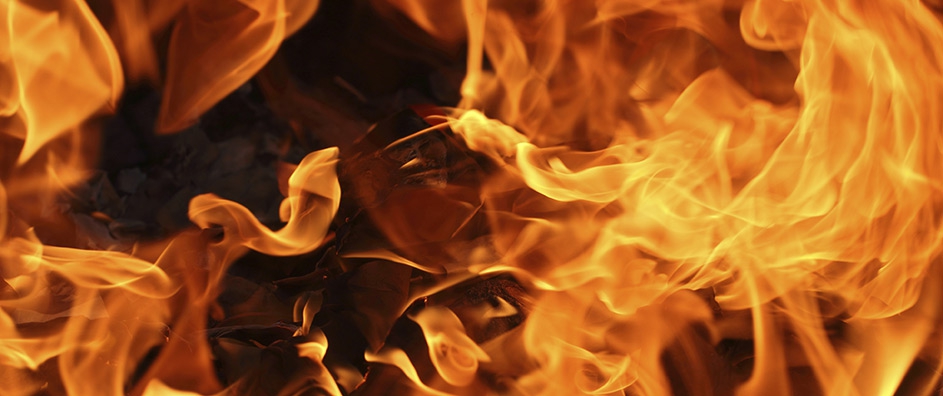The views expressed in our content reflect individual perspectives and do not represent the authoritative views of the Baha'i Faith.
For a while during my boyhood my parents sent me to a Lutheran church in the little farm town where we lived. The minister there came from the hellfire-and-brimstone school of preaching, so most Sundays at the pulpit he thundered on and on about sin, damnation and the fiery furnaces of hell.
I’ve forgotten his name—in fact, I probably erased it from my memory long ago—but I remember those scary sermons. The minister’s deep voice and stern, piercing eyes made me quake when they found me in my pew. I never saw a horror movie as a child, but that church was my horror movie, where visions of the tortures of hell frightened and traumatized me.
 “If you sin,” the minister would tell us, “you will burn in hell forever!” He vividly described the details, which included a lake of fire and ceaseless burning and torture. The Devil, he said, would stab sinners with his pitchfork. Their suffering would last for all eternity.
“If you sin,” the minister would tell us, “you will burn in hell forever!” He vividly described the details, which included a lake of fire and ceaseless burning and torture. The Devil, he said, would stab sinners with his pitchfork. Their suffering would last for all eternity.
Of course this made me intensely curious about what constituted a sin.
I asked in Sunday School. “You sin when you do something wrong,” the Sunday school teacher told me.
This terrified me even further, because my seven-year-old imagination immediately conjured up all the major wrongs I had recently committed—eating a cookie at home without permission; coveting my friend Jon’s bike; hiding my new comic book from my little brother. For sure, I thought, I’m going to hell. For weeks I moped around, dreading life and fearing the future, knowing that my eternal fate was sealed.
Luckily I had a kind mother.
She noticed that I seemed downcast and asked why. I told her I knew I was going to hell. And bless her heart, she just laughed.
She said “Hell isn’t real.” And those three words did it. What a relief! I believed my mother, of course, much more than I believed the hellfire-and-brimstone guy.
This early childhood fundamentalist-induced trauma led me to think quite a bit about the subject of hell as an adult. I became intensely curious about the whole idea of a hell, the very concept of eternal torment and punishment. I wrote papers about it in school, read all I could, researched its origins and tried to learn about the various historical myths that surround it.
And after leaving the church at thirteen, and rejecting any God who would sanction such a permanent genocidal torture chamber, I searched for a faith that had a more sophisticated, nuanced and realistic view of sin, damnation and hell.
I found that religion when I encountered the Baha’i Faith.
Baha’is believe that the idea of hell doesn’t represent a place—but instead represents a spiritual condition that can afflict us anytime and anywhere:
O ye lovers of God! Be kind to all peoples; care for every person; do all ye can to purify the hearts and minds of men; strive ye to gladden every soul. To every meadow be a shower of grace, to every tree the water of life; be as sweet musk to the sense of humankind, and to the ailing be a fresh, restoring breeze. Be pleasing waters to all those who thirst, a careful guide to all who have lost their way; be father and mother to the orphan, be loving sons and daughters to the old, be an abundant treasure to the poor. Think ye of love and good fellowship as the delights of heaven, think ye of hostility and hatred as the torments of hell. – Abdu’l-Baha, Selections from the Writings of Abdu’l-Baha, pp. 244-245.
“Hostility and hatred as the torments of hell,” Abdul-Baha wrote, encapsulating the Baha’i concept of hell as simply a symbol of inner remoteness from God. The Baha’i writings describe heaven as a state of nearness to God, and hell as a condition of remoteness and estrangement from our own spiritual reality.
For Baha’is, these inner states of being emerge as a natural consequence of each person’s individual efforts to develop and educate the soul.
So hell, as most of us already know, can happen right here—we don’t need to wait for death and some fiery subterranean abyss. We’ve all felt it—the deep depression of failure, the pain and suffering that the loss of love can cause, the terrible consequences wrong choices often create, the sense that the world holds nothing but tests and difficulties. Even worse, hell can mean we continually harbor all of that hatred and hostility for others—and even for our own selves.
In this short series of essays, let’s take a look at the history of hell, explore its origins and meanings, delve into its purposes, discover five pretty amazing new things you may not have known about hell, and see if we can figure out what it truly means.
















Comments
Sign in or create an account
Continue with Googleor